An Interview With My Grandmother, Who Knows Everyone In Bluegrass Music

Winfield is a sun-bleached spot of a city in the middle of southeastern Kansas’s farmlands. It’s unremarkable except that it is the home of the Walnut Valley Festival, a long-running bluegrass festival that hosts the National Flatpicking Championship.
My grandmother, Jane Laughlin, worked at the Walnut Valley Festival—”the Festival,” as we call it—for more than 40 years. The Festival is an outdoor acoustic music festival that attracts musicians from around the world every September. “Only the best guitar players played the Winfield festival,” she told me.
My grandma was 34 when she started working at the Festival, and she had never listened to bluegrass, but it soon came to define her life. My dad grew up stomping around the muddy campgrounds and tooling around backstage, and when I was born I did the same.
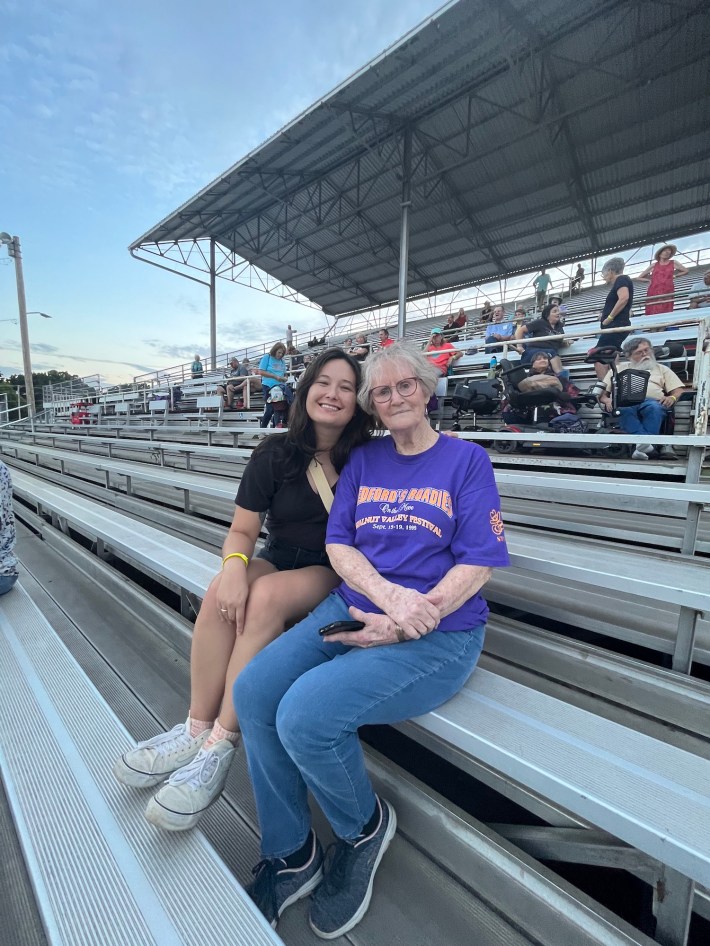
She started off in ticket sales, then drove entertainers to and from the Festival for a few years, but for most of the 40-odd years, she was the hostess for the festival, which meant that she was in charge of hospitality for the entertainers who came through to perform. Some of my earliest memories are of bouncing on a motel bed on warm September days while artists came through her ever-open door, picking up wristbands and schedules and tickling under my chin. She became close with many of them and is a fount of stories from the front lines of the last 50 years in bluegrass music.
Bluegrass is a huge part of my family’s life because of my grandma. We all play instruments (to varying degrees of mastery), and my aunt and dad go to the festival whenever they can. The last time I went was in 2022, and it reignited my interest in playing banjo.
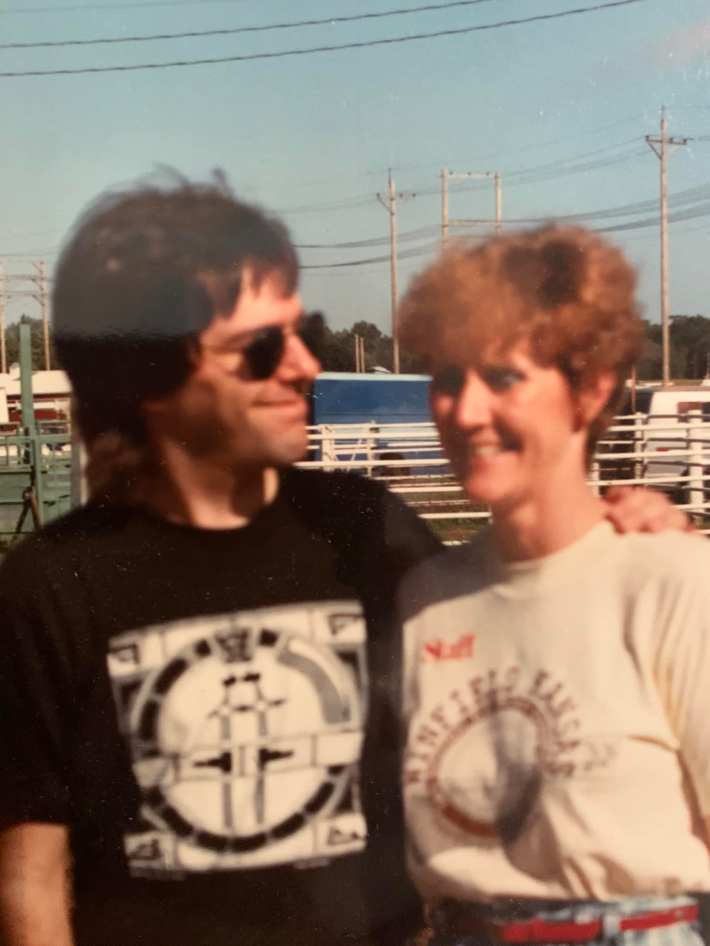
My aunt, who has been the keeper of most of the family’s heirlooms, sold her house this summer and gave me a bunch of the family treasures: an old secretary desk, my grandfather’s record player, and tons of photos and silver-plated brass. I filled a moving van with them and drove down to Winfield to visit my grandma. While I was there, she insisted on adding something more to my inheritance: her 600-CD collection.
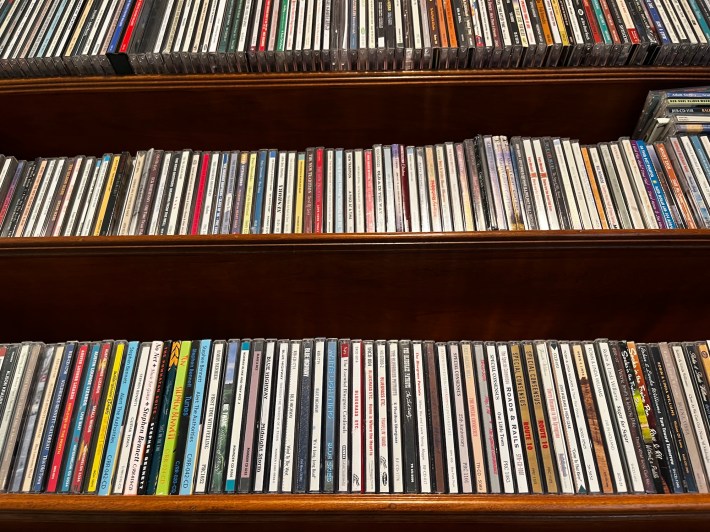
The CDs are alphabetized and most of them are signed, and they filled four boxes that we carefully placed among the old wooden furniture in the van. I don’t have a working CD player, and I am a bit overwhelmed with the sheer mass of the collection, but I plan to start working through them bit by bit. The collection is the product of her life’s work and the lasting legacy of bluegrass music in our family. I decided to interview my grandma about her bluegrass life.
Do you remember what your impression of bluegrass was when you first heard it?
Well, my first impression was that it was very raw and hard on the ear. Your grandpa used to say Scotch was an acquired taste, and I decided that’s what bluegrass music is. If you don’t grow up with it, if you’re introduced to it, it’s an acquired taste, because it’s so raw.
There’s a lot going on.
There’s a lot going on, a lot of instruments, the harmonies—I loved it right off the bat. So I took a folding chair over to Stage One and sat beside the porta potty, and kept the crowd out.
Wow, so you were the bouncer.
I knew I knew who the entertainers were. I’d acquainted myself by looking at the pictures. And so I knew, you know, they were, if someone came along and wanted to use it, I had to say, “No, you’ll have to find another one.”
Your time at the festival brought you into close proximity with a lot of famous musicians. Didn’t you see The Chicks get their start there?
Oh, yes, The Dixie Chicks were just a group of four young women: Martie [Maguire] and Emily [Strayer], and two older women, Laura Lynch and Robin Macy. Robin was the lead singer, and then the others played instruments and sang too, and they had beautiful harmonies.
They played in the campgrounds, just hanging out, jamming with people. They got to be very popular out in the campgrounds, and at some point they also were asked to take a spot on one of the stages, and that’s how they got their start at the Walnut Valley Festival. And then there was Alison Krauss—she was 13 years old when she won the fiddle championship.
Oh, wow, were you there for that?
Oh yeah. I’ve known Alison since she was 16. It’s been a lot of fun watching her. What I always think about with Alison is when you were a little girl, and I said something about Alison Krauss, and you said, “She sings like an angel.”
She does! I heard Alison Krauss on a playlist recently, and I had that same thought: “She sings like an angel.”
She does. She was always real sweet. One year, she had a puppy, and dogs are strictly forbidden at the Walnut Valley Festival, so she had to keep the puppy on her bus. She needed a bowl to have water on the bus for her dog, and she took the ice bucket out of the motel room and put that on the bus. I personally paid the motel owner for that bucket, because the motel owner wasn’t very happy with someone absconding with an ice bucket out of their room.
You probably got to know people really well when you were driving them to and from the festival, right?
Some people did talk, and some people didn’t. And if people didn’t talk, I kept my mouth shut. So John McCutcheon—gosh—you know, he was very young when I first met him, too. And so I’ve known John for a long time. He’s always been a favorite of mine and of yours.
Yes.

And you are a favorite of his. Tom Chapin is another one. I had gone to a festival in Kansas City, and he was playing up there, and we started talking, and I came back to Winfield and told the Redfords, “Boy, you really need to get this guy.” And so after a couple of years, they did hire him, and he’s been a regular since. He’s a very, very big crowd favorite. Now, another person I might mention that I got acquainted with was John Hartford.
The year he came, he drove up in his bus, and he and his bus driver came in to check in. I gave them their passes and asked if there was anyone else with them. And John said, “Well, yeah, my wife Marie is on the bus, but she won’t wear a wristband.” I said, “Well, if she wants to get out with you at all on the festival grounds, she’ll have to have a wristband on.” And he said, “Well, she won’t do it.” And I said, “OK well, let me try.”
So I walked outside and John and his bus driver stayed in my room. As the hostess, I had a motel room in one of the local motels, and that’s where people came to check in with me. So I walked out, and Marie was just getting off the bus with her dog to take it out for a little potty stop. And I said, “Oh, hi, Marie. I’m Jane. I’m your hostess to the Walnut Valley Festival. It’s really nice to have you here.” I said, “I hope you’re not planning on spending your whole time on the bus.” And she said, “Well, I’ll go wherever John goes.” And I said, “Well, you’ll want to put a wristband on you then, so you don’t get picked up by the festival police.” And she said, “Oh, OK, which wrist??”
Wow, that was so easy.
Oh, it was. I walked back in there, and John and the bus driver looked at each other and looked at me and said, “You’re alive. Wow.” They really thought I’d have a terrible time getting her to do it. I saw them a few times after that, and they were always very nice and very personable.
Did you ever have an interest in playing music?
No, I’m just not musically inclined at all. It just doesn’t translate from my brain to my fingers. It is kind of a funny story how I came to get that banjo you have.
Oh, I would love to know. I’m looking at the banjo right here—it’s right next to me.
It was 1990, and I had been to Korea to go to your parents’ wedding. And when I came back, I had a ticket to go to MerleFest, which is a festival that Doc Watson’s people started as a memorial for Doc’s son Merle, who had died in a tractor accident.
I didn’t mind going to festivals by myself, because I had so many friends when I got where I was going, among the artists. So it was a four-day festival, and they were selling chances on a lot of things. They had drawings on stage, and on Sunday of the festival, they were drawing on the banjo and a guitar, and a couple of other instruments. There was this one young man—every time I’d get to the festival grounds from my hotel, he’d show up and try to sell me a ticket for the drawing. And I kept telling him, “No, not today.” Well, each day he’d find me and try to sell me a ticket. So finally, on Sunday, I bought a ticket for the drawings and when they drew my name, I couldn’t believe it. I won the banjo.
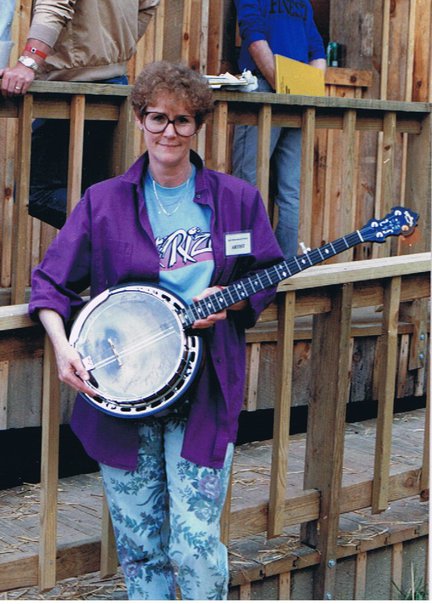
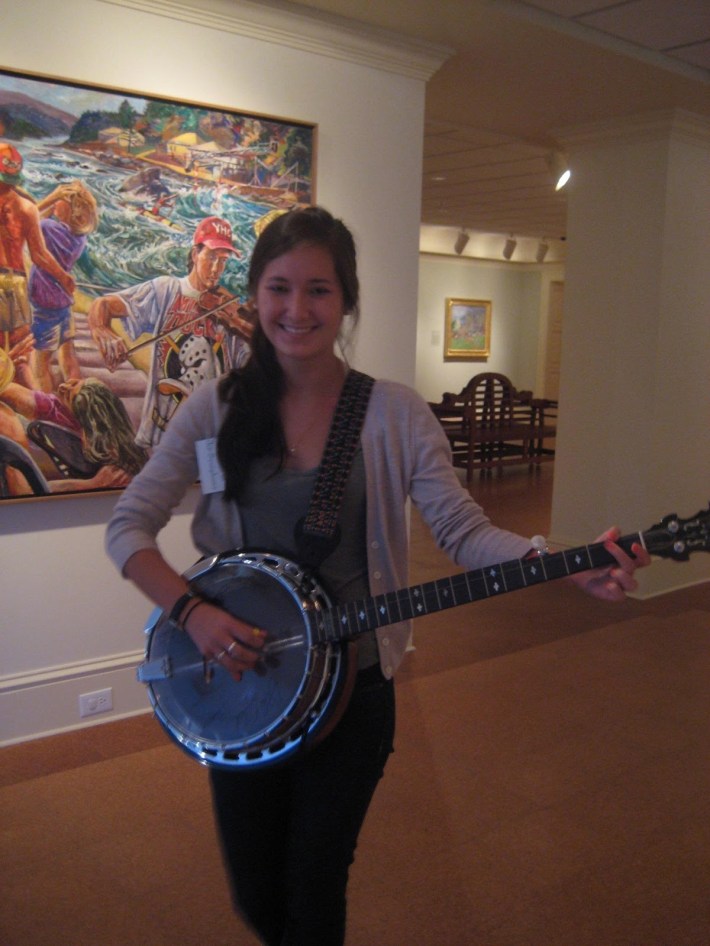
I didn’t realize that this is at a different festival.
Yeah, it was at MerleFest. All week, I had been trying to get backstage to say hello to Doc Watson, because I knew him from Winfield. I’d always speak to him, and he always recognized me from my perfume. He’d say, “Oh, hello, Jane!” You know, Doc Watson was blind.
You do have a distinctive smell.
Well, my grandmother used to always have a certain scent and so did my mother, I guess it was the powder they used. So anyway, I kept trying to get back there, and finally, on Sunday, after I won that banjo, I walked up to the gate, and the same young man was there watching the gate, watching people go in and out of the gate, and keeping people out that weren’t supposed to be there. I walked up to date with that banjo in my hand, and he just opened the gate and let me in.
Can you tell me that story again that you told us when we were all together about going to the Grand Ole Opry with your brother?
Oh well yes, I can. We didn’t grow up with any kind of music influences, except country music. My brother Warren came to the Winfield festival a couple of times, and Alison and Laura Lynch were both friends, and they were both singers he liked.
This one year, the International Bluegrass Music Association trade show and Fan Fest were in Nashville. Orin Friesen had gotten me involved the first year I went to IBMA working backstage during the award show. Oren said they needed someone that knew who the entertainers were and could identify them and be able to find them in a pinch. So that’s what originally got me backstage.
Well, there in Nashville, we were having the award show at the Ryman Auditorium, which is the original home of the Grand Ole Opry. The first time I walked down the alley behind the Ryman, up the stone steps, into the back door, and out onto that backstage, I was just in awe. It’s hard to even explain. This was where all the greats had stood. Bill Monroe played there. Hank Williams. Elvis Presley. Just name almost any name in country music and they all played there at that Ryman Auditorium, and when I looked out from that stage, you could just feel their ghosts.
So Warren got there in the afternoon, and I had to go over to the Ryman to set up my tables and set out the awards. And we walked in, and Ricky Skaggs and his band were on the stage doing the sound check for the evening’s performance. When they finished it, Ricky turned around and saw me and said “Hi, how’re you doing?” We talked a minute, and Warren was like, “Wow.”
After they left, he quietly crept his way out to the center of the stage where Ricky had been standing, and just stood there and looked around the Ryman Auditorium. He told me later he was just soaking up the history of the place.
He was standing there, and out walked Alison Krauss from the dressing rooms. She had apparently just had a shower and washed her hair—she was in a robe and had a towel wrapped around her head.
“Oh, hi, Jane. How are you?” Well, I didn’t introduce Warren to Alison because she had her hair up and I wasn’t really sure how to handle that. So we chatted, and then she went back to do whatever she was doing, and Warren was a puddle on the floor.
Ever after that, when we’d be together, he would introduce me to any of his friends, “This is my sister, Jane. She knows Ricky Skaggs and Alison Krauss.”
Wow. He was proud of you!
Oh, I know another story I haven’t told you yet. Bill Monroe was the father of bluegrass music. He’s the one that started bluegrass music. When Bill Monroe died, it was in the first part of September, and IBMA was at the end of September. It was right after the Walnut Valley Festival. I finished with the festival on Sunday and went home and washed and packed my clothes and left the next morning for Owensboro, Kentucky, where the IBMA was being held that year.
I had gotten acquainted with a man from New Jersey who is a writer and a fan of bluegrass music. He had written an obituary for Bill Monroe that was in the New York Times, and he was going down to Rosine, Kentucky to take a copy of that obituary to Bill’s sister, Bertha, and his niece that Bertha lived with. Bill was in his 80s when he passed, and I think Bertha, and Bertha was older than he was, so she was closer to 90.
He invited me to go along. So I rode down there with him, and we went to Bertha’s home. I never met Bill Monroe, I never saw him in person. But we sat there in that humble home with a big wood stove, and sit there and visit with them about their family and their Uncle Pen. There’s a song that Bill had written about Uncle Pen: “High on the hill and above the town / Uncle Pen played the fiddle, lord how it would ring.”
But just to sit there and listen to them talk, and I thought, “This is their family. This is their history.” And it just really touched me to be there and to be able to experience that moment.
After we visited with them, we stood and held hands in a circle, four of us, and while Bertha said a prayer for us and then thanked us for coming. Then we drove around Rosine and the home of Bill Monroe, and then went to what they believed was the homestead of Uncle Pen. It was on the hill and above the town. We drove up as far as we could, and we walked on up to where Uncle Pen’s cabin stood, and we looked down over across the little town of Rosine, and you could almost hear it. I sure did. I heard the music—“High on the hill and above the town, Uncle Pen played the fiddle, lord how it rang.”
So I want to talk about the CDs. What was it like to see me packing up the CDs and to know that I’m taking them?
Oh, I’m thrilled. The CDs mean a lot to me. You know, the memories they hold. Now there are a lot of CDs mixed in there of people that weren’t what you would call “top-shelf artists.” They were one-timers or two-timers at the Winfield Festival, and they would give their CDs away. But they just mean so much to me to know that you have them, and you and Dana care about them and are interested in them means a lot to me.
Wow. You’ve spent so much of your life really up close to legends. Do you feel like you learned anything from them?
Just to be humble. Don’t spend any time bragging about yourself—however, this sounds like I’m bragging about myself during this interview—
Now I’m asking you the questions, so that’s different.
OK. No, I just have felt so fortunate for years to have been able to meet the people I’ve met, to go the places I’ve gone, to be able, you know, be where I’ve been. If they’ve taught me anything, it’s just be humble.







